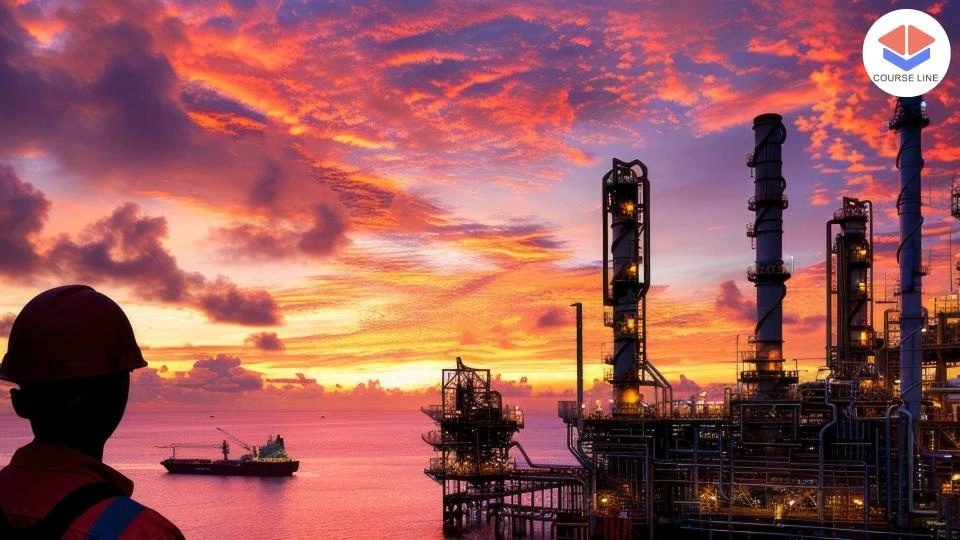Course Features
Price
Study Method
Online | Self-paced
Course Format
Reading Material - PDF, article
Duration
7 hours, 15 minutes
Qualification
No formal qualification
Certificate
At completion
Additional info
Coming soon
- Share
Overview
The Petroleum Engineering Level 3 Advanced Diploma provides an in-depth understanding of the oil and gas industry, with a focus on the key disciplines of petroleum engineering. The course begins by introducing students to the basics of petroleum engineering, including an overview of the oil and gas industry, petroleum geology, exploration methods, and the essential role of petroleum engineers in managing and optimizing oil and gas production. Students will learn about reservoir engineering fundamentals, the behavior of fluid properties, and the technologies used to maximize resource extraction.
A major component of the course is drilling engineering, where students explore well design, planning, and drilling equipment technologies. Emphasis is placed on drilling safety and environmental considerations to ensure that students understand the critical importance of maintaining safety standards and minimizing environmental impact. In addition to drilling, students will dive into reservoir engineering, focusing on the analysis and modeling of reservoirs, along with enhanced oil recovery (EOR) techniques that help optimize resource extraction from aging fields.
The course also explores production engineering, where students will gain practical knowledge of well completion, workover operations, artificial lift methods, and surface facilities. Formation evaluation and petrophysics are critical to understanding subsurface conditions, and students will learn techniques such as wireline logging, core analysis, and formation pressure evaluation. Health, safety, and environmental (HSE) practices are emphasized throughout the course, equipping students with the skills to ensure compliance with regulations and to manage risks effectively.
Further into the course, students will learn about project management, cost estimation, and budgeting, which are essential skills for handling large-scale petroleum engineering projects. The course also covers advanced topics, such as unconventional oil and gas resources, offshore drilling, and emerging technologies in the industry. The program concludes with a research project, where students will apply their knowledge to real-world problems, conduct data analysis, and present their findings.
Who is this course for?
The Petroleum Engineering Level 3 Advanced Diploma provides an in-depth understanding of the oil and gas industry, with a focus on the key disciplines of petroleum engineering. The course begins by introducing students to the basics of petroleum engineering, including an overview of the oil and gas industry, petroleum geology, exploration methods, and the essential role of petroleum engineers in managing and optimizing oil and gas production. Students will learn about reservoir engineering fundamentals, the behavior of fluid properties, and the technologies used to maximize resource extraction.
A major component of the course is drilling engineering, where students explore well design, planning, and drilling equipment technologies. Emphasis is placed on drilling safety and environmental considerations to ensure that students understand the critical importance of maintaining safety standards and minimizing environmental impact. In addition to drilling, students will dive into reservoir engineering, focusing on the analysis and modeling of reservoirs, along with enhanced oil recovery (EOR) techniques that help optimize resource extraction from aging fields.
The course also explores production engineering, where students will gain practical knowledge of well completion, workover operations, artificial lift methods, and surface facilities. Formation evaluation and petrophysics are critical to understanding subsurface conditions, and students will learn techniques such as wireline logging, core analysis, and formation pressure evaluation. Health, safety, and environmental (HSE) practices are emphasized throughout the course, equipping students with the skills to ensure compliance with regulations and to manage risks effectively.
Further into the course, students will learn about project management, cost estimation, and budgeting, which are essential skills for handling large-scale petroleum engineering projects. The course also covers advanced topics, such as unconventional oil and gas resources, offshore drilling, and emerging technologies in the industry. The program concludes with a research project, where students will apply their knowledge to real-world problems, conduct data analysis, and present their findings.
Requirements
The Petroleum Engineering Level 3 Advanced Diploma provides an in-depth understanding of the oil and gas industry, with a focus on the key disciplines of petroleum engineering. The course begins by introducing students to the basics of petroleum engineering, including an overview of the oil and gas industry, petroleum geology, exploration methods, and the essential role of petroleum engineers in managing and optimizing oil and gas production. Students will learn about reservoir engineering fundamentals, the behavior of fluid properties, and the technologies used to maximize resource extraction.
A major component of the course is drilling engineering, where students explore well design, planning, and drilling equipment technologies. Emphasis is placed on drilling safety and environmental considerations to ensure that students understand the critical importance of maintaining safety standards and minimizing environmental impact. In addition to drilling, students will dive into reservoir engineering, focusing on the analysis and modeling of reservoirs, along with enhanced oil recovery (EOR) techniques that help optimize resource extraction from aging fields.
The course also explores production engineering, where students will gain practical knowledge of well completion, workover operations, artificial lift methods, and surface facilities. Formation evaluation and petrophysics are critical to understanding subsurface conditions, and students will learn techniques such as wireline logging, core analysis, and formation pressure evaluation. Health, safety, and environmental (HSE) practices are emphasized throughout the course, equipping students with the skills to ensure compliance with regulations and to manage risks effectively.
Further into the course, students will learn about project management, cost estimation, and budgeting, which are essential skills for handling large-scale petroleum engineering projects. The course also covers advanced topics, such as unconventional oil and gas resources, offshore drilling, and emerging technologies in the industry. The program concludes with a research project, where students will apply their knowledge to real-world problems, conduct data analysis, and present their findings.
Career path
The Petroleum Engineering Level 3 Advanced Diploma provides an in-depth understanding of the oil and gas industry, with a focus on the key disciplines of petroleum engineering. The course begins by introducing students to the basics of petroleum engineering, including an overview of the oil and gas industry, petroleum geology, exploration methods, and the essential role of petroleum engineers in managing and optimizing oil and gas production. Students will learn about reservoir engineering fundamentals, the behavior of fluid properties, and the technologies used to maximize resource extraction.
A major component of the course is drilling engineering, where students explore well design, planning, and drilling equipment technologies. Emphasis is placed on drilling safety and environmental considerations to ensure that students understand the critical importance of maintaining safety standards and minimizing environmental impact. In addition to drilling, students will dive into reservoir engineering, focusing on the analysis and modeling of reservoirs, along with enhanced oil recovery (EOR) techniques that help optimize resource extraction from aging fields.
The course also explores production engineering, where students will gain practical knowledge of well completion, workover operations, artificial lift methods, and surface facilities. Formation evaluation and petrophysics are critical to understanding subsurface conditions, and students will learn techniques such as wireline logging, core analysis, and formation pressure evaluation. Health, safety, and environmental (HSE) practices are emphasized throughout the course, equipping students with the skills to ensure compliance with regulations and to manage risks effectively.
Further into the course, students will learn about project management, cost estimation, and budgeting, which are essential skills for handling large-scale petroleum engineering projects. The course also covers advanced topics, such as unconventional oil and gas resources, offshore drilling, and emerging technologies in the industry. The program concludes with a research project, where students will apply their knowledge to real-world problems, conduct data analysis, and present their findings.
-
- Introduction to the oil and gas industry 00:10:00
- Petroleum geology and exploration 00:10:00
- Fundamentals of reservoir engineering 00:10:00
- Role of petroleum engineers in the industry 00:10:00
-
- Drilling fundamentals 00:10:00
- Well design and planning 00:10:00
- Drilling equipment and technologies 00:10:00
- Drilling safety and environmental considerations 00:10:00
- Reservoir characterization and modeling 00:10:00
- Fluid properties and behavior 00:10:00
- Reservoir performance analysis 00:10:00
- Enhanced oil recovery (EOR) techniques 00:10:00
- Wireline logging and interpretation 00:10:00
- Core analysis and sampling 00:10:00
- Formation pressure evaluation 00:10:00
- Reservoir rock properties 00:10:00
- Project planning and execution 00:10:00
- Cost estimation and budgeting 00:10:00
- Risk management 00:10:00
- Project reporting and evaluation 00:10:00
- Hands-on experience in the field or with industry partners 00:10:00
- Real-world problem-solving and application of knowledge 00:10:00
- Exam of Petroleum Engineering Level 3 Advanced Diploma 00:50:00

No Reviews found for this course.
Is this certificate recognized?
Yes, our premium certificate and transcript are widely recognized and accepted by embassies worldwide, particularly by the UK embassy. This adds credibility to your qualification and enhances its value for professional and academic purposes.
I am a beginner. Is this course suitable for me?
Yes, this course is designed for learners of all levels, including beginners. The content is structured to provide step-by-step guidance, ensuring that even those with no prior experience can follow along and gain valuable knowledge.
I am a professional. Is this course suitable for me?
Yes, professionals will also benefit from this course. It covers advanced concepts, practical applications, and industry insights that can help enhance existing skills and knowledge. Whether you are looking to refine your expertise or expand your qualifications, this course provides valuable learning.
Does this course have an expiry date?
No, you have lifetime access to the course. Once enrolled, you can revisit the materials at any time as long as the course remains available. Additionally, we regularly update our content to ensure it stays relevant and up to date.
How do I claim my free certificate?
I trust you’re in good health. Your free certificate can be located in the Achievement section. The option to purchase a CPD certificate is available but entirely optional, and you may choose to skip it. Please be aware that it’s crucial to click the “Complete” button to ensure the certificate is generated, as this process is entirely automated.
Does this course have assessments and assignments?
Yes, the course includes both assessments and assignments. Your final marks will be determined by a combination of 20% from assignments and 80% from assessments. These evaluations are designed to test your understanding and ensure you have grasped the key concepts effectively.
Is this course accredited?
We are a recognized course provider with CPD, UKRLP, and AOHT membership. The logos of these accreditation bodies will be featured on your premium certificate and transcript, ensuring credibility and professional recognition.
Will I receive a certificate upon completion?
Yes, you will receive a free digital certificate automatically once you complete the course. If you would like a premium CPD-accredited certificate, either in digital or physical format, you can upgrade for a small fee.
Course Features
Price
Study Method
Online | Self-paced
Course Format
Reading Material - PDF, article
Duration
7 hours, 15 minutes
Qualification
No formal qualification
Certificate
At completion
Additional info
Coming soon
- Share
Emergency Medicine Residency Interview Prep Course
Course Line242£490.00Original price was: £490.00.£14.99Current price is: £14.99.Public Administration Level 7 Advanced Diploma
Course Line238£490.00Original price was: £490.00.£14.99Current price is: £14.99.Microneedling Level 7 Advanced Diploma
Course Line237£490.00Original price was: £490.00.£14.99Current price is: £14.99.





